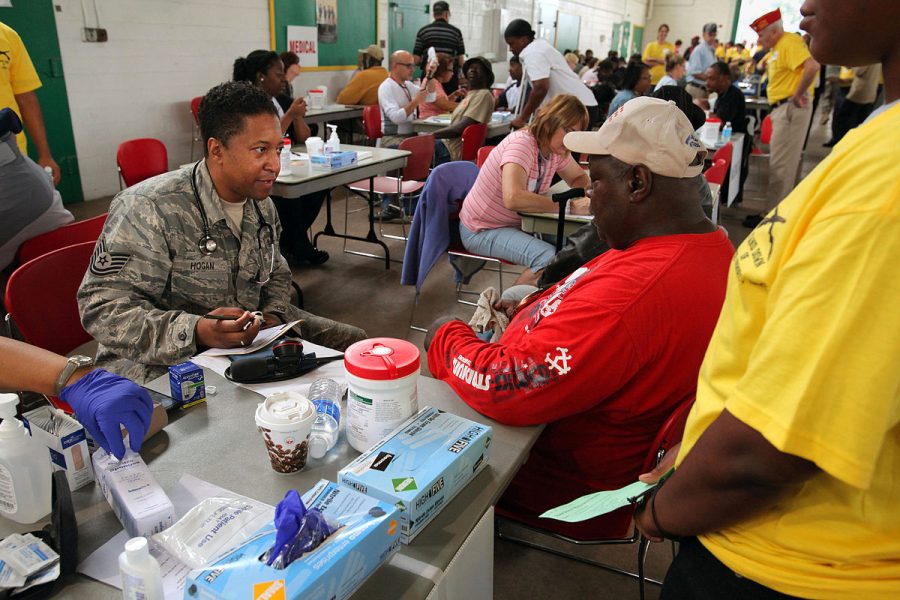Opinion | Veteran mental health struggles remain overlooked
Photo courtesy of Sgt. Mark Olsen/Wikimedia Commons
Sgt. Jamal J. Hogan takes the medical information of a homeless veteran during Stand Down 2012, an event that aids homeless veterans such as mental health screenings, on Sept. 28, 2012. Opinions Editor Aparna Lakkaraju argues that the mental health of veterans continues to be an issue that is ignored.
Jun 2, 2022
Trigger warning: This column discusses sexual violence and suicide.
Memorial Day was designated a federal holiday by Congress in 1971 to honor all that died serving in the U.S. military. Although the holiday is not officially meant to honor all veterans who served — Veteran’s Day falls on November 11 — it still serves as a reminder to support the estimated 19 million veterans residing in the United States as of September 2021.
Veterans are defined as individuals who have previously served on active duty in the U.S. Armed Forces and make up roughly 7% of the American population. They are a vulnerable population, yet are critically overlooked and lack many basic support systems.
Many mental health issues disproportionally affect veteran populations. One often overlooked result of military service is Military Sexual Trauma, which is an individual’s experience with sexual harassment or assault during their period of service in the military. Although it disproportionately affects more women (1 in 4) than men (1 in 100), more men struggle with MST due to gender demographics in military enrollment.
Veterans also face high rates of substance abuse disorders, PTSD, depression and suicide. In fact, veterans face a 50% higher risk of suicide than individuals who did not serve in the military — a bone-chilling statistic.
Get The Daily Illini in your inbox!
Although the U.S. Department of Veteran Affairs has mental health resources available to veterans, less than 50% of veterans receive any treatment.
Many barriers prevent veterans from getting help, such as embarrassment and shame, long wait times to receive treatment and the negative stigma surrounding mental health. As veteran mental health continues to be untreated, a “snowball effect” occurs where these issues culminate into a larger problem — veteran homelessness.
On any given night in January 2021, 19,750 veterans were experiencing sheltered homelessness according to the U.S. Department of Housing and Urban Development. Sheltered homeless individuals live in emergency shelters, safe havens or transitional housing.
Veteran homelessness has been in a steady decline since 2009, but that does not mean it has gone away for good. As of 2021, 8% of all sheltered homeless individuals were veterans. There are significant racial disparities among sheltered veterans — Black Americans make up 12% of the overall veteran population yet comprise over a third of all sheltered homeless veterans.
Thankfully, steps are being taken to combat veteran homelessness. Homeless shelters and transitional housing has increased the amount of specifically allotted beds for veterans, and this number seems to be gradually increasing annually.
Additionally, “veterans helping veterans” groups such as the National Coalition for Homeless Veterans advocate for veterans’ rights and provide safe, substance-free environments that give veterans the opportunity to regain their lives. The Department of Veterans Affairs, which is a government-funded institution, also provides support for veterans, though it has low favorability rates among veterans.
Champaign-Urbana also has its own county-funded Veteran’s Assistance Commission whose purpose is to provide temporary assistance to veterans and their families. Unfortunately, the commission has limited funding and has turned away several veterans due to a decrease in donations.
The solution to the underlying problem behind veteran homelessness delves far deeper than shallow fixes. Addressing and fixing the stigma surrounding mental health and problematic practices such as military sexual violence is key to encouraging veterans to seek mental health support and heal.
Aparna Lakkaraju is a freshman in LAS.






